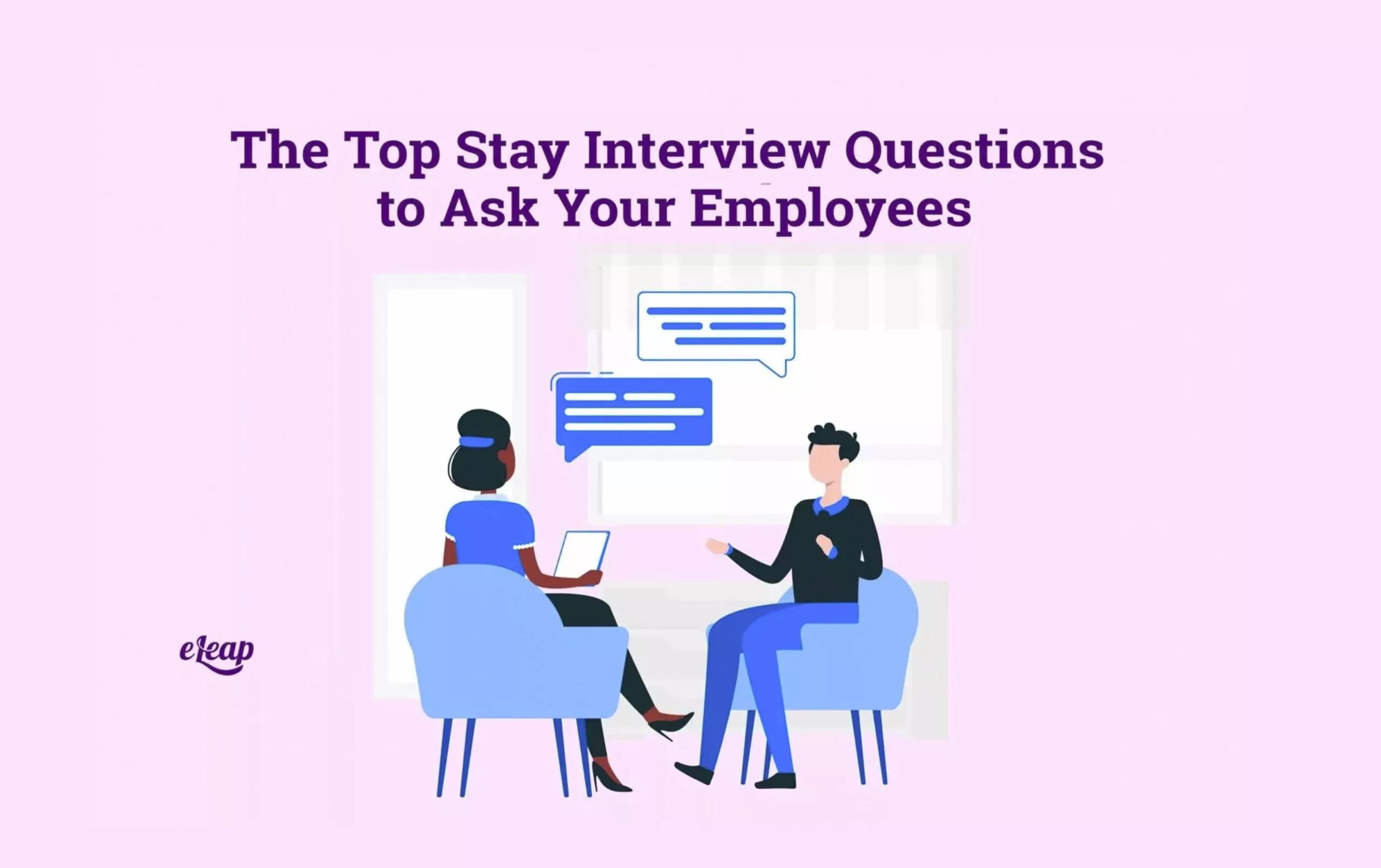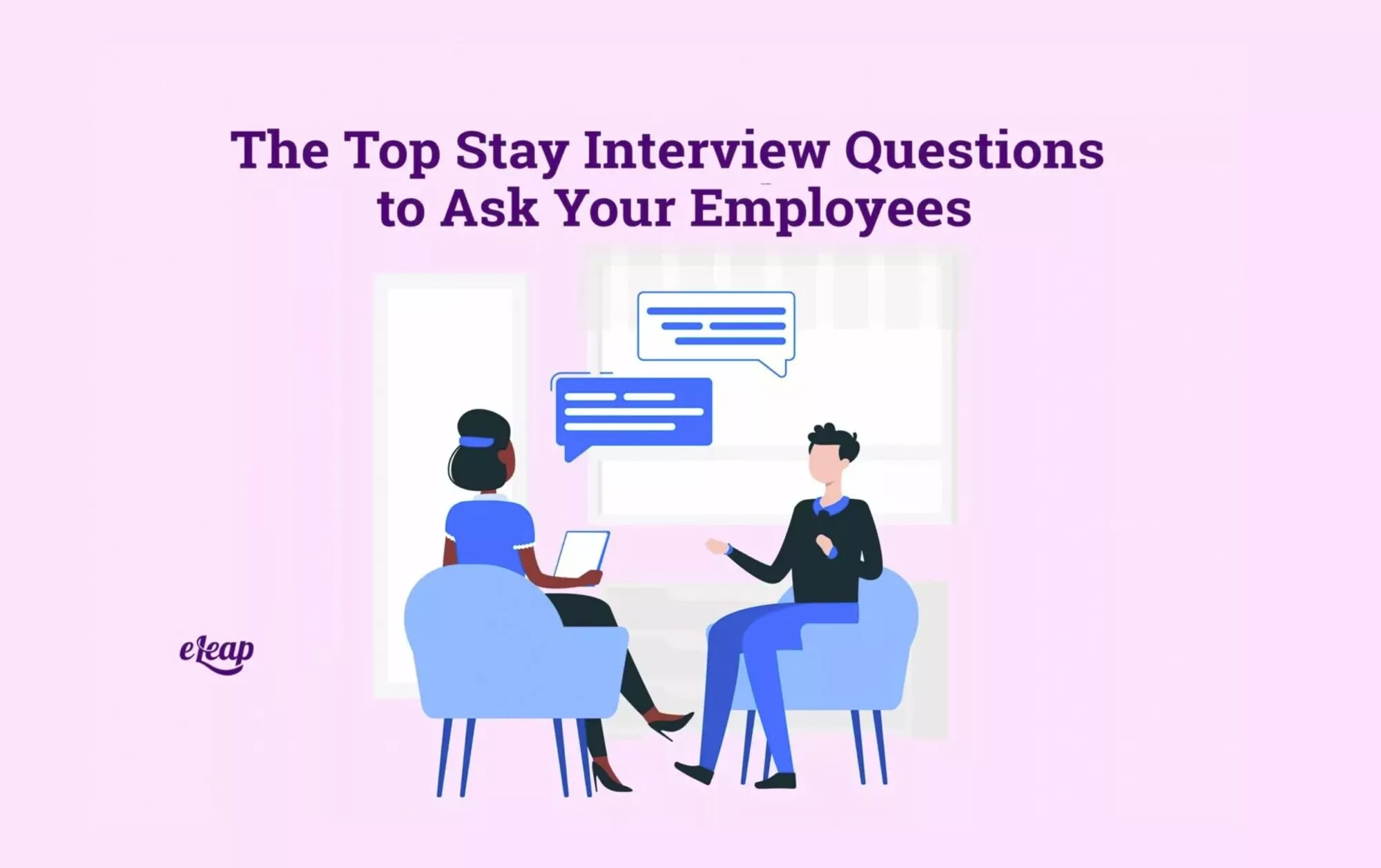The Top Stay Interview Questions to Ask Your Employees

Many organizations are obsessed with having exit interviews, but few think twice about stay interview questions. Exit interviews are loved by some leaders and considered nearly useless by others. An exit interview gives awareness of why workers are leaving, but it seems a bit too late. Because of that, many companies are switching to stay interviews instead.

While the main reason to implement stay interviews is to increase retention rates, it can offer other benefits. Many things can be discovered through stay interview questions that are important for the organization as a whole.
What Is a Stay Interview?
During a stay interview, managers talk one-on-one with employees to get an idea of what would make them stay or leave the company. It seems like an excellent idea to get this information when you consider the high costs of turnover, but adoption hasn’t caught on everywhere.
Nonprofit HR notes that only 30% of businesses use stay interviews to keep employees, while about 90% do exit interviews.
There are a variety of reasons for stay interviews to be implemented. Once they are in place, they can do the following things:
- Create trust between team members and managers or team members and HR
- Find out why workers want to stay working at a company or what might make them likely to leave for a competitor
- Understand more about employee’s stances on their job and what might be useful to change
- Obtain actionable information about upcoming and current employee trends around the workplace
- Better understand the employee’s specific strengths, weaknesses, hopes, fears, and worries
- Find out what workers appreciate and what might motivate them to work harder toward the company’s mission
- See if any issues need to be resolved between the worker and their team members or managers
- Engage on a one-on-one level to indicate that employee opinions are valued
When you ask the right stay interview questions, you learn what people are bothered by before they choose to leave. As such, these interviews fit into a current engagement and retention strategy. This article will delve into how to execute stay interviews and share the best stay interview questions to use.
How to Get Started with Stay Interviews
Having once-a-week one-on-ones between workers and managers is a great idea. It can let you get an idea of your risks to retention on an ongoing basis. However, when you speak to HR experts, you’ll find that they do not believe these meetings should be the only source of gauging employee engagement. Open and honest dialogue about career trajectory and job satisfaction may not always be easy to implement into the weekly agenda for the many one-on-ones that are being done.
For those who are only beginning to think about stay interviews, the best option is to keep the one-on-ones going as usual and add in stay interviews as a separate process. It’s up to you to decide how often to polish those stay interview questions and bring people in to chat. A good way to start is once every quarter with a meeting that lasts about 30 minutes.
Another way to learn more about how employees are feeling is by adding annual or more frequent sessions with full departments. These listening sessions are larger-scale versions of stay interviews that you have for individual workers. Having these as their own conversation often means that the departments involved take them a bit more seriously.
If you choose to go this way, you might have stay interviews for everyone every few months or so. Then every six months, larger interviews can be implemented for groups. When you use the stay interview questions regularly, everyone gets used to the process and doesn’t try to get out of participating in them. It shows employees that management cares about what they have to say.
When stay interviews are a formal part of the company culture, everyone participates in them, regardless of whether they seem fully engaged or not. Some managers look at workers and use both verbal and non-verbal cues to determine whether they may be unhappy. Stay interview questions let you get more information and a real idea of who is happy and who isn’t.
Stay interviews should be done with those who lack motivation, as well as those who seem very engaged. Some choose to schedule them before the next performance review. This lets you get all their thoughts to share with HR members or managers to use during a performance review.
The Best Stay Interview Questions to Ask
Stay interviews and one-on-one conversations should complement your employee surveys. The best stay interview questions aren’t going to be the same ones you use in other cases. While some surveys are quick and require nothing more than picking options from those provided, stay interviews go deeper than that. Tone, body language, and other factors can come into play. Follow-up questions can also be used.
The best stay interview questions are ones that revolve around moments of growth, team and individual achievements, career planning, and job satisfaction. They should delve into how the company or management can ensure an employee is supported in what they do.
The format of the conversation encourages the employees to be candid, authentic, and organic in their responses. The conversational style makes it much more effective than simply surveys.
When looking at what HR and business leaders recommend as stay interview questions, several stand out from the pack. Many of these relate to manager support, career growth, and relationships in the workplace. While asking all of these may be overkill, using some one year and others the next can be useful.
1. Using a scale from one to 10, how close is your position to your fantasy job?
2. Do you consider your peers only coworkers, acquaintances, or friends?
3. Are there any things that could be done to make performing your job easier?
4. What have you appreciated the most about working here?
5. Do you expect to be working here in a year? What about two years?
6. When you think about how the business takes care of you, how satisfied are you?
7. Have you been given enough development prospects?
8. Do you have any suggestions about how to improve employee engagement?
9. Do you think your suggestions and ideas are given consideration?
10. If one thing could be changed to improve morale, what would it be?
11. Can you maintain a healthy work-life balance?
12. How much anticipation do you have for Fridays? Do you hate the thought of Mondays?
13. Is anyone or anything making you feel as if you aren’t respected at work?
14. Which projects are your most and least favorite to work on?
15. What things do you most and least like about this company?
16. Have you considered other opportunities?
17. Have you been given a clear growth path for the future?
18. Which of your skills or talents haven’t been utilized so far?
19. Do you think progress within the company is urged?
20. What thoughts do you have about this talk?
Choose five to seven of these questions and use them for the initial stay interview. Select other ones to bring up the next round. Feel free to add specific questions associated with your workplace to make sure you get all the insight you desire.
Who Should Ask Stay Interview Questions?
Many people have managers ask stay interview questions, but that isn’t a hard and fast rule. In some situations, having HR do it might even be the better option. Many leaders are of the opinion that HR teams are trained to get more actionable and honest feedback than managers when leading meetings like these. In addition, having HR in charge of stay interviews can create a better connection between the company and the HR department.
As someone in HR, it may be easier for employees to talk to you than it is to speak with a manager. Sometimes it adds a sense of openness to the process. It also gives the HR workers a chance to learn more about what everyone is doing on a daily basis, which gives HR the chance to truly ensure support is available for them. In addition, HR leaders have no particular stake in the feedback that comes in, so asking challenging questions may be easier for them than for those in leadership.
When HR asks stay interview questions, they can easily launch into follow-up questions about what is being discussed. It lets members of HR and other employees have a new touchpoint to connect over. Employees may be reminded that HR is there as a resource, and it’s normal to come to them when there are questions that need to be answered.
In Conclusion
It should never be a surprise that a top-performing employee puts in their two weeks’ notice. When it comes to retention, one of the best tools a human resources department can implement is a stay interview. Asking the right stay interview questions ensures you know whether employees are disengaged or dissatisfied, so something can be done about it before anyone decides to walk away from the company. The eLeaP Performance Management Plan, which includes s continuous performance management system, provides organizations with powerful options to attract and retain high-caliber team members.